Americans’ views on Israel differ sharply by party and age

This Pew Research Center analysis focuses on U.S. and Israeli views of the other country, the current state of U.S.-Israel relations and confidence in U.S. President Joe Biden. The report also explores demographic and partisan differences among the publics of both countries.
In Israel, the survey was conducted face to face from March 16 to May 1, 2022, among 1,000 adults. Interviews were conducted in both Arabic and Hebrew and the survey is representative of the adult population ages 18 and older, excluding those in East Jerusalem and non-sanctioned outposts (the survey also does not include the West Bank or Gaza). The survey is weighted to be representative of the Israeli adult population with the following variables: gender by ethnicity, age by ethnicity, education, region, urbanity and probability of selection of respondent.
In the United States, we surveyed 3,581 U.S. adults from March 21 to 27, 2022. Everyone who took part in this survey is a member of the Center’s American Trends Panel (ATP), an online survey panel that is recruited through national, random sampling of residential addresses. This way nearly all U.S. adults have a chance of selection. The survey is weighted to be representative of the U.S. adult population by gender, race, ethnicity, partisan affiliation, education and other categories. Read more about the ATP’s methodology.
Notably, the Israeli survey was conducted prior to the June 20 announcement that the governing coalition was collapsing, elections were being called for the fall and Yair Lapid would replace Naftali Bennett as prime minister until the results of the elections were clear. Throughout this report, any references to the “governing parties” or “the coalition” refers to the Bennett-Lapid coalition that was in power during the fieldwork and prior to the governmental collapse. For more, see the Appendix.
Here are the questions used for the report, along with responses, and the survey methodology.
As President Joe Biden embarks on his first visit to Israel as president, he does so against an amicable backdrop: A majority of adults in both Israel and the United States have favorable views of the other country and the current state of bilateral relations. But Israeli views of the relationship are somewhat rosier than American ones. And, with Biden in the White House, the intensity of positive sentiment in Israel toward the U.S. has diminished, with Israelis offering mixed reviews of the president’s leadership relative to his predecessor, Donald Trump. Israelis were also divided on former Prime Minister Naftali Bennett’s handling of the U.S. relationship in this survey, which was fielded prior to the June collapse of the government and Yair Lapid’s ascension as caretaker prime minister.
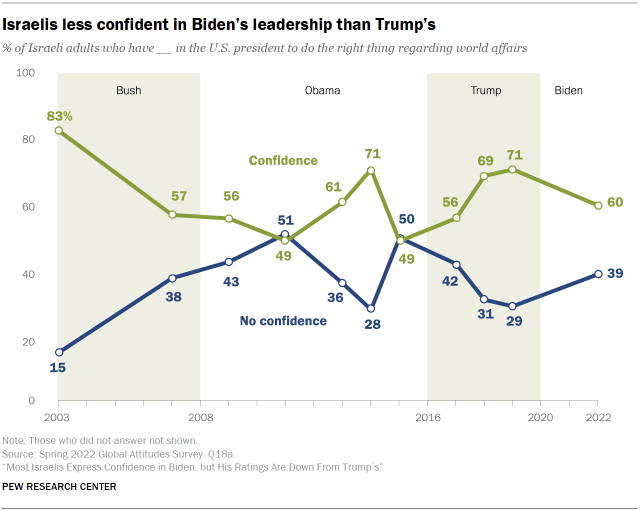
Timing of the Israel survey and how we analyze party differences in Israel
The Israeli survey took place from March 16 to May 1, 2022 – over a month before the June 20 announcement that the governing coalition was collapsing, elections were being called for the fall and Yair Lapid would replace Naftali Bennett as prime minister until the results of the elections were clear.
Because of the large number of parties in the Israeli political system and the size of the survey, we do not have sufficient sample sizes to analyze the opinions of the supporters of any single political party other than Likud and Yesh Atid (There is a Future). For this reason, we focus our political analysis on those who supported any of the eight parties that were part of the Bennett-Lapid coalition at the time the survey was fielded, compared with those who did not support those parties. Because the Bennett-Lapid coalition was composed of leaders from across the political spectrum and included Arab as well as Jewish parties, we also analyze survey questions using each respondent’s ideological self-placement on the left, right or center of the political spectrum.
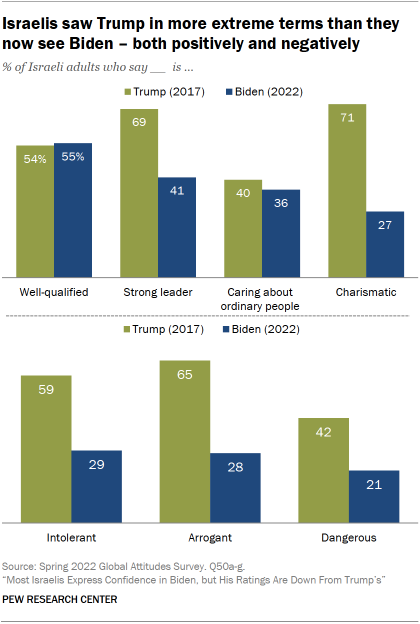
Israel stood out as one of the only countries (among 37 surveyed worldwide) where marks for Trump were higher than for former President Barack Obama in 2017, and Israelis’ confidence in Trump actually grew during his presidency. Today, 60% of Israelis say they have a great deal or some confidence in Biden to do the right thing regarding world affairs, down 11 percentage points from assessments of Trump in 2019. The share of Israelis who express a lot of confidence in Biden is also about half the share who said the same of Trump (16% vs. 30%, respectively).
When asked about the U.S. president’s specific qualities, Israelis are less likely to attach the positive descriptions of “strong leader” and “charismatic” to Biden in 2022 than they were to describe Trump that way in 2017. (Roughly equal shares of the Israeli public described both U.S. presidents as “well-qualified” and as “caring about ordinary people.”)
On the other hand, Israelis are much less likely to describe Biden as dangerous than they were to view Trump that way (21% for Biden vs. 42% for Trump), and only around three-in-ten see Biden as arrogant or intolerant, whereas majorities described Trump in those negative terms.
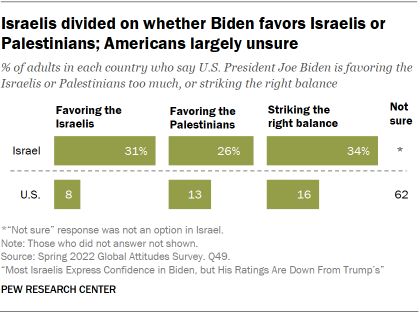
Israelis are also divided in their assessments of Biden’s policies in the region: Around a third think Biden favors the Israelis too much (31%), roughly a quarter say he favors the Palestinians too much (26%) and 34% think he’s striking about the right balance.
Americans have limited awareness of whether Biden is favoring the Israelis, favoring the Palestinians or striking the right balance: 62% say they do not know (in the U.S., a “not sure” option was made explicit; in Israel, people had to voluntarily skip the question). A minority of U.S. adults express an opinion, with 16% saying he’s striking the right balance, 13% saying he favors the Palestinians and 8% saying he favors the Israelis.
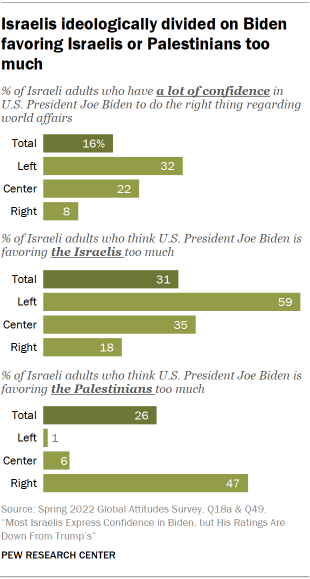
Israeli opinion on this topic is divided along ideological lines. Those who place themselves on the ideological left (59%) are much more likely than those in the center (35%) or on the right (18%) to say Biden favors the Israelis too much. The opposite is true when it comes to perceptions that he favors the Palestinians too much: 47% on the right believe this, compared with 6% in the center and 1% on the left. Those who place themselves in the center (50%) are the most likely to say he’s striking the right balance (35% of the left and 26% of the right agree).
Those on the ideological left are also more likely to describe Biden in positive terms like “charismatic,” less likely to ascribe the negative adjective of “dangerous” to him and more likely to say current U.S.-Israel relations are in good shape. They are also more likely to have a lot of confidence in his handling of world affairs, but they see the U.S. in a less favorable light than those on the ideological right.
Israelis are also divided along partisan, ethnic and religious lines. Israelis who supported the Bennett-Lapid governing coalition tend to have more confidence in Biden, and to approve more of his policies, than those who opposed the governing coalition (for more on the changes in the governing coalition, see Appendix).
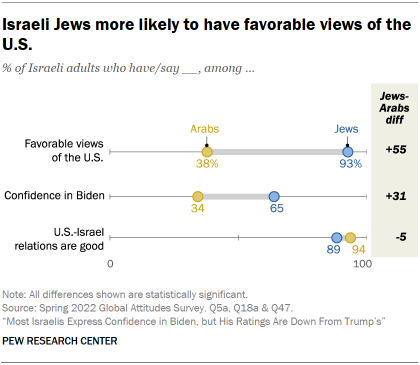
Israeli Jews and Israeli Arabs diverge sharply in their assessments, as well. Jews (65%) are much more likely than Arabs (34%) to express confidence in Biden and to think he strikes the right balance between Israelis and Palestinians (though Jews are also more likely to say he favors the Palestinians too much). And Jewish Israelis are more than twice as likely as Arab Israelis to report favorable views of the U.S. (93% vs 38%).
These differences between Jews and Arabs in Israel somewhat obfuscate the enormous divisions within the Jewish community. Most notably, Jews who describe themselves as Haredi (“ultra-Orthodox”) or Dati (“religious”) tend to have much less confidence in Biden and more negative views of his policies than those who describe themselves as Masorti (“traditional”) or Hiloni (“secular”).
Jewish religious groups in Israel: Haredim, Datiim, Masortim and Hilonim
Nearly all Israeli Jews identify with one of four categories: Haredi (commonly translated as “ultra-Orthodox”), Dati (“religious”), Masorti (“traditional”) or Hiloni (“secular”). The spectrum of religious observance in Israel – on which Haredim are generally the most religious and Hilonim the least – does not always line up perfectly with Israel’s political spectrum. On some issues, including those pertaining to religion in public life, there is a clear overlap: Haredim are furthest to the right, and Hilonim are furthest to the left, with Datiim and Masortim in between. But on other political issues, including those related to the Israeli-Palestinian conflict and views of the U.S., differences between religious groups do not always mirror those between people at different points on the ideological spectrum. Because of sample size considerations, in this report we combine Haredim and Datiim for analysis.
For more information on the different views of these religious groups, see the Center’s 2016 deep dive on the topic, “Israel’s Religiously Divided Society.”
Most Americans and Israelis agree the bilateral relationship is in positive shape
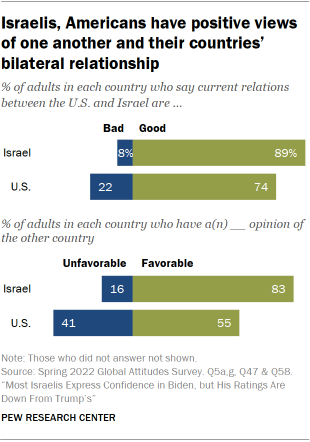
Biden took office seeking to rebalance U.S. policy toward Israel, and former Prime Minister Bennett said he wanted to inject “a new spirit of cooperation” into the relationship. Although the Bennett-Lapid coalition has called new elections for the fall, Israeli Prime Minister Yair Lapid, who is welcoming Biden on his state visit, does so against a positive backdrop: 89% of Israelis and 74% of Americans think bilateral relations are in good shape.
Arab Israelis are more intensely positive in how they see relations compared with Jews, but generally speaking, nearly all Israelis see U.S.-Israel relations in positive terms.
In the U.S., too, there is bipartisan agreement: A majority of both Republicans and Democrats describe Israel-U.S. relations as good.
When people in each country are asked about their views toward the other country, however, the results are more lopsided: 83% of Israelis say they have favorable views of the U.S., compared with just 55% of Americans who say the same about Israel.
While overall favorable views of the U.S. are unchanged since 2019, the share of Israelis who have very favorable views of the U.S. has fallen 9 percentage points over the same period, from 40% to 31%. And while nearly nine-in-ten Israelis think bilateral relations are in good shape, this is nonetheless a decline from the 98% who said relations with the U.S. were positive under Trump in 2019. Moreover, 39% of Israelis say relations in 2022 are very good – a significant decline from the 63% who said the same three years ago.
Republicans, older Americans have more positive views of Israel
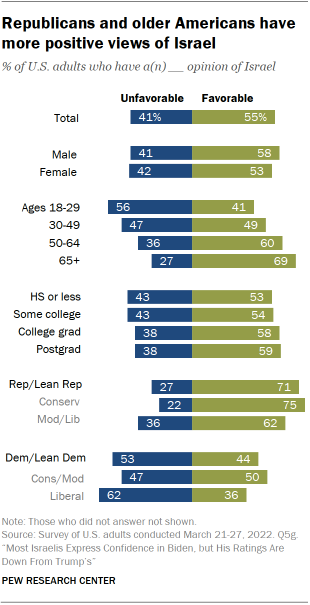
In the U.S., views of Israel differ substantially across partisan lines and among age groups. Around seven-in-ten Republicans and independents who lean toward the Republican Party have positive views of Israel, compared with 44% of Democrats and independents who lean toward the Democratic Party. Conservative Republicans are even more favorable toward Israel than are liberal and moderate Republicans, and the same is true of conservative and moderate Democrats relative to liberal Democrats. Republicans also have more favorable views of the Israeli people and Israeli government than Democrats.
Opinions of Israel also differ substantially across U.S. age groups. While 69% of those ages 65 and older and 60% of those ages 50 to 64 have positive views of Israel, opinion among younger age groups is more mixed. Among U.S. adults under 30, 56% have an unfavorable view of Israel.
This youngest age group also stands apart for expressing cooler views of the Israeli people –and warmer views of the Palestinian people – than older Americans. Whereas older Americans express more positive feelings toward the Israeli people than toward the Palestinian people, this is not the case for U.S. adults under 30, who view the Palestinian people at least as warmly (61% very or somewhat favorable) as the Israeli people (56%). Younger Americans also rate the Palestinian government as favorably (35%) as the Israeli government (34%), while older Americans express more favorable views of the Israeli government than of the Palestinian government. (The survey did not define “Palestinian government” for respondents. Much of the West Bank continues to be administered by the Palestinian Authority, under the leadership of Mahmoud Abbas, while Gaza has been governed by Hamas since 2007.)
These are among the key findings of two Pew Research Center surveys. In the U.S., the survey was conducted on the Center’s nationally representative American Trends Panel, among 3,581 adults from March 21 to 27, 2022. In Israel, a nationally representative survey was conducted via in-person interviews from March 16 to May 1, 2022, among 1,000 Israelis. Other key findings in the report include:
- In the U.S., while we have not asked whether Americans hold favorable or unfavorable views of Israel since 2013 (when 61% expressed a favorable view of the country), other recent survey data from the Center’s American Trends Panel shows that Americans have become modestly more positive toward both the Israeli people and the Israeli government. (For more on how views of the country are related to views of the people or the government, see “When Americans think about Israel, what do they have in mind?”)
- Nearly half of Israelis say that economic and cultural boycotts of Israel are a major threat to the country, and an additional 36% say they are a minor threat. Still, more describe infectious disease, cyberattacks and the condition of the global economy as major threats to Israel than say the same of boycotts.
- Americans, for their part, have very limited awareness of the boycott, divestment and sanctions (BDS) movement against Israel: Only 3% of Americans have heard “a lot” about BDS, and an additional 12% say they have heard “some” about it.
- A majority of Israelis (55%) also disapprove of Biden’s plans to reopen the U.S. Consulate in East Jerusalem.


